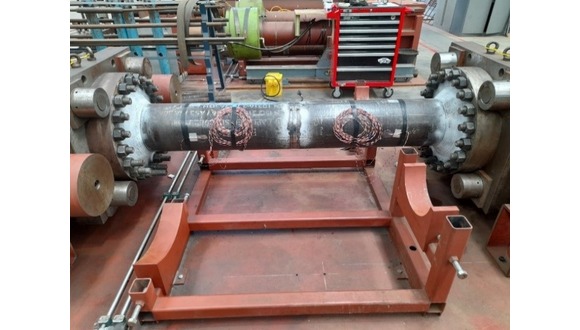Wed, 22 May, 2024
A research paper co-authored by experts from TWI and BP is due to be presented at the upcoming 2024 ASME Pressure Vessels and Piping Conference in Bellevue, Washington, USA.
The conference is taking place from 28 July to 2 August, 2024, where BP’s Geoff Evans will present on, ‘Integrity of Carbon Steel Pressure Piping: An Assessment Based on Probabilistic Fracture Mechanics and Full-Scale Testing.’
Carbon steel pressure piping, used in petrochemical and other industrial environments, is typically designed and constructed in accordance with a recognised engineering code such as ASME B31.3, and has an excellent safety record. But, given the potentially dire consequences of a catastrophic failure (such as brittle fracture), how can we estimate the probability of failure of pressure piping and thereby manage overall engineering risk? Direct observation (number of failures per km of piping per year) is one approach, but has limitations: a single failure can hugely affect the statistics, and factors known to influence brittle failure (for example, operating temperature and pressure, the toughness of the materials used, the fabrication/inspection methods adopted) are not always explicitly addressed by this method.
An alternative approach, adopted in this work, is to use a theoretical model, based on probabilistic fracture mechanics (PFM) and to ‘calibrate’ it using full-scale tests on real samples of pressure piping tested in the laboratory. We used commercially-available carbon steel pressure piping material and fabricated a series of girth welds in it, using processes, procedures and consumables to meet typical requirements of low-temperature pressure piping compliant with ASME B31.3. We then used a battery of small-scale tests (Charpy, tensile, hardness, fracture toughness) to characterise the low-temperature properties of the parent material and welds in detail. In other matching welds, we introduced artificial defects, far larger than normal fabrication flaws, and calculated to be large enough to induce brittle fracture when the joints were loaded in tension, using the test rig shown below.

The probability of failure was estimated using the UK flaw assessment procedure BS 7910:2019 (‘Guide to Methods for Assessing the Acceptability of Flaws in Metallic Structures’) and results compared with actual behaviour of the full-scale tests.
Because the Charpy properties of the ‘typical’ piping material and weldments greatly exceeded the requirements of ASME B31.3, tests had to be carried out at very low temperatures (as low as -160⁰C) in order to induce brittle failures. And those failures didn’t always take place in the manner anticipated, partly because of our inability to model welding residual stresses statistically (BS 7910 gives guidance on the subject, but only in terms of an upper bound). Nevertheless, the work provides evidence that welds containing large flaws can be safely employed well below the temperature at which they meet the Charpy criteria currently mandated by ASME B31.3.
About PVP 2024
The 2024 ASME Pressure Vessels and Piping Conference, provides the ideal platform to keep up with new technologies, network and interact with experts, practitioners, and peers in the Pressure Vessels and Piping sectors.
The PVP Conference is a recognised international forum that brings together participants from more than 40 countries across Europe, Africa, the Middle East, Asia, the Americas and Oceania.
You can find out more about PVP 2024, here.